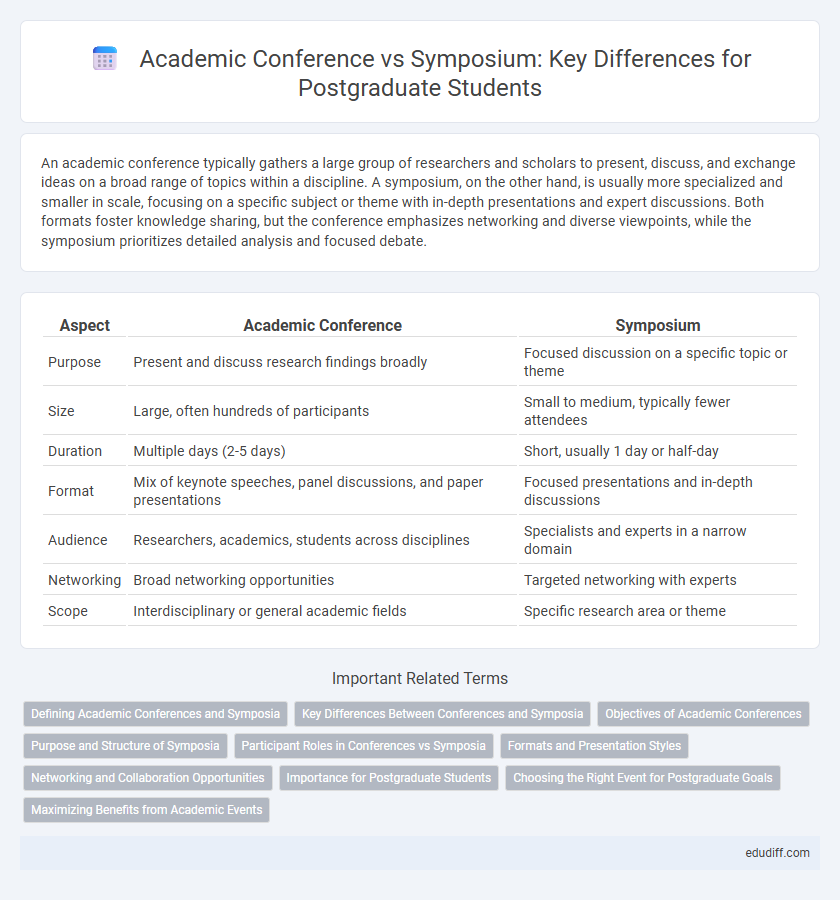An academic conference typically gathers a large group of researchers and scholars to present, discuss, and exchange ideas on a broad range of topics within a discipline. A symposium, on the other hand, is usually more specialized and smaller in scale, focusing on a specific subject or theme with in-depth presentations and expert discussions. Both formats foster knowledge sharing, but the conference emphasizes networking and diverse viewpoints, while the symposium prioritizes detailed analysis and focused debate.
Table of Comparison
| Aspect | Academic Conference | Symposium |
|---|---|---|
| Purpose | Present and discuss research findings broadly | Focused discussion on a specific topic or theme |
| Size | Large, often hundreds of participants | Small to medium, typically fewer attendees |
| Duration | Multiple days (2-5 days) | Short, usually 1 day or half-day |
| Format | Mix of keynote speeches, panel discussions, and paper presentations | Focused presentations and in-depth discussions |
| Audience | Researchers, academics, students across disciplines | Specialists and experts in a narrow domain |
| Networking | Broad networking opportunities | Targeted networking with experts |
| Scope | Interdisciplinary or general academic fields | Specific research area or theme |
Defining Academic Conferences and Symposia
Academic conferences are formal gatherings where researchers present papers, share findings, and engage in discussions across various disciplines, often spanning several days with structured sessions and keynote speeches. Symposia are more focused events, typically centered on a specific topic or theme, featuring expert presentations and panel discussions to facilitate in-depth exploration. Both serve as platforms for knowledge exchange, but symposia emphasize concentrated dialogue and expertise within a narrower subject area.
Key Differences Between Conferences and Symposia
Academic conferences typically involve a larger scale gathering with diverse presentations, including keynote speeches, panel discussions, and poster sessions, aimed at broad scholarly exchange across multiple topics. Symposia are more specialized events, focusing on a single subject area or theme, featuring in-depth presentations and discussions by experts to foster detailed exploration and collaboration. The key differences lie in scope, participant diversity, and the format of interaction, with conferences emphasizing breadth and networking, while symposia prioritize depth and expert engagement.
Objectives of Academic Conferences
Academic conferences aim to facilitate the dissemination of advanced research findings and foster networking among postgraduate scholars and experts within specialized fields. These events provide structured sessions for presenting peer-reviewed papers, encouraging scholarly debate, and promoting collaborative opportunities that advance academic disciplines. Emphasis is placed on knowledge exchange, professional development, and aligning research agendas with emerging trends and interdisciplinary approaches.
Purpose and Structure of Symposia
Symposia serve as focused academic gatherings designed to promote in-depth discussion on specific topics, often organized around thematic sessions led by expert presenters. They typically feature a structured schedule with targeted presentations followed by collaborative dialogue, facilitating specialized knowledge exchange and networking among postgraduate researchers. Unlike broader academic conferences, symposia emphasize concentrated scholarly interaction within a narrower field of study to advance critical insights.
Participant Roles in Conferences vs Symposia
Academic conferences primarily involve participants as presenters, panelists, and attendees, where sharing original research and networking are central activities. Symposia feature specialized roles such as invited speakers and discussants, emphasizing in-depth discussion and critical analysis of specific topics. Participants in symposia often engage more interactively, with structured dialogue and expert feedback integral to the format.
Formats and Presentation Styles
Academic conferences typically feature multiple parallel sessions with a variety of presentation formats such as keynote speeches, panel discussions, and poster presentations, allowing for broader scholarly interaction. In contrast, symposiums usually present a more focused, coherent series of presentations centered on a specific theme, often involving in-depth talks followed by expert panels or roundtable discussions. Both formats emphasize rigorous academic discourse but differ in their structure and intensity of participant engagement.
Networking and Collaboration Opportunities
Academic conferences gather a diverse range of scholars, providing extensive networking opportunities across multiple disciplines, ideal for building broad professional connections. Symposiums typically focus on specialized topics, fostering deeper collaboration and targeted discussions among experts in niche fields. Both formats enhance postgraduate researchers' access to mentorship and collaborative projects, crucial for academic and professional growth.
Importance for Postgraduate Students
Academic conferences and symposiums offer postgraduate students valuable opportunities for professional development and networking within their fields. Conferences typically feature diverse presentations and panels, enabling exposure to a wide range of research topics and current trends, while symposiums focus on in-depth discussions around a specific subject, promoting specialized knowledge and scholarly exchange. Engaging in these events enhances research skills, fosters academic collaborations, and contributes significantly to career advancement in postgraduate education.
Choosing the Right Event for Postgraduate Goals
When selecting between an academic conference and a symposium for postgraduate goals, consider that conferences typically offer broader networking opportunities and diverse research presentations, enhancing scholarly visibility. Symposia concentrate on specialized topics, facilitating in-depth discussions and collaboration with experts in a focused field. Aligning event choice with specific academic objectives and research interests maximizes professional development and knowledge exchange.
Maximizing Benefits from Academic Events
Academic conferences typically gather a broad range of experts and feature multiple sessions, workshops, and networking opportunities, maximizing exposure to diverse research and innovative ideas. Symposia often focus on a specific topic or theme, providing a more concentrated environment for in-depth discussions and specialized knowledge exchange. Selecting the right event based on research goals enhances professional development, collaboration potential, and the overall impact of academic participation.
Academic Conference vs Symposium Infographic

 edudiff.com
edudiff.com